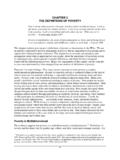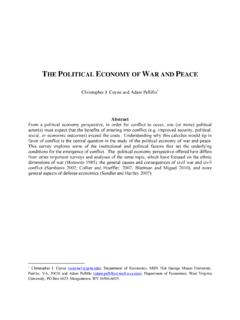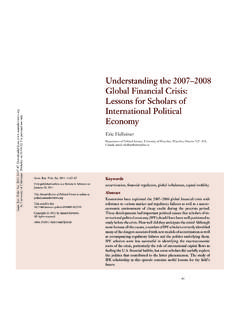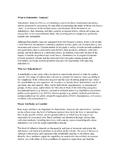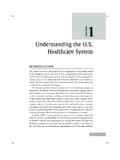Transcription of The Political Economy of Decentralization Reforms
1 "For too long, Decentralization has been considered a technical issue. This volume calls a spade a spade. Decentralization is a Political act. It is driven by Political considerations, and its outcome will depend on how the Political forces that stand to gain stack up against those that may lose. Not only does this perspective help explain the experience with Decentralization in many countries, but the volume shows how development partners even if they cannot interfere in the politics of a developing country can help improve the welfare of poor people in decentralizing societies." Shanta Devarajan Chief Economist of the Africa Region at the World Bank "In spite of their rhetoric, central governments generally do not undertake Decentralization Reforms in order to enhance efficiency or accountability.
2 They do so in order to promote complex and varied Political agendas. As a result, the best intentions of development partners can easily be frustrated if they fail to account for the Political goals and incentives that structure the Decentralization process. Drawing on the academic literature and experiences from a number of countries, Eaton, Kaiser, and Smoke offer a useful and practical set of guidelines for supplementing traditional welfare economics analysis with explicit Political Economy analysis. This work provides a foundation for structuring a much needed dialogue about how to move from reflection to better analysis and practice." Jonathan Rodden Associate Professor of Political Science at Stanford University This volume does the necessary work of broadening and deepening the analysis of Decentralization to provide a systematic understanding of Political and bureaucratic dynamics.
3 It moves away from the overly simplistic approaches of economics textbooks and examines how Political incentives, bureaucratic interests, and power distributions interact with economic variables. By providing a clear and systematic framework for identifying and assessing important Political interests and institutions, the volume serves as an important tool for gauging when we might anticipate and try to avoid Decentralization 's unwanted and unintended consequences and how we might pursue Reforms that are likely to be more productive. Lily L. Tsai Associate Professor of Political Science at the Massachusetts Institute of Technology "Traditional public finance recommends a clear sequencing of Decentralization -first functions, then finance, and finally functionaries.
4 But when Political Economy is introduced, standard prescriptions may be unworkable. Instead of a neat, logical progression, we observe a seemingly confusing world of asymmetric and redundant roles and responsibilities among tiers of government. In the context of fragility and conflict, some countries invest in local government to achieve a stable state when the center is still weak. Through a Political Economy lens, such contradictions to "best practice" may seem rational and even "optimal" policy choices. This volume makes a convincing case that Political Economy and public finance together offer more potent and viable policy options than either alone." Junaid K. Ahmad Sector Manager at the World Bank The Political Economy of Decentralization Reforms Eaton, Kaiser, and Smoke The Political Economy of Decentralization Reforms Implications for Aid Effectiveness Kent Eaton, Kai Kaiser, and Paul Smoke THE WORLD BANK THE WORLD BANK THE Political Economy OF Decentralization Reforms :IMPLICATIONS FOR AID EFFECTIVENESS* University of California-Santa Cruz, World Bank, New York EATONKAI KAISERPAUL SMOKE*THE WORLD BANKW ashington, 2010 The International Bank for Reconstruction and Development/The World Bank1818 H Street NW Washington DC 20433 Telephone: 202-473-1000 Internet.
5 Rights reserved1 2 4 11 10 10 This volume is a production of the staff of the International Bank for Reconstruction and Development/The World Bank. The findings, interpretations, and conclusions expressed in this volume do not necessarily reflect the views of the Executive Directions of The World Bank or the government they World Bank does not guarantee the accuracy of the date included in this work. The boundaries, colors, denominations, and other information shown on any map in this work do not imply any judgment of the part of The World Bank concerning legal status of any territory or the endorsement or acceptance of such boundariesRights and PermissionsThe material in this publication is copyrighted. Copying and/or transmitting portions or all of this work without permission may be a violation of applicable law.
6 The International Bank for Reconstruction and Development/The World Bank encourages dissemination of its work and will normally grant permission to reproduce portions of the work permission to photocopy or reprint any part of this work, please send a request with complete information to the Copyright Clearance Center Inc., 222 Rosewood Drive, Danvers, MA 01923, USA; telephone: 978-750-8400; fax; 978-750-4470; Internet: other queries on rights and licenses, including subsidiary rights, should be address to the Office of the Publisher, the World Bank, 1818 H Street NW, Washington, DC 20433, USA; fax: 202-522-2422; e-mail: picture: Highway Crossing, J rgen Zeller iiiAbstract viiAcknowledgements ixApplied Political Economy of Decentralization : An Overview xiA.
7 The Premise and Purpose xiB. The Approach xiiInitial Context and Motivation xiiiKey Actors and the Centrality of Incentives xvShifting reform Dynamics xvRoles and Incentives of Development Partners xviiC. Operational Implications xviiIntroduction 1 The Centrality of Politics 1 Analytical Gaps and Challenges: A Pragmatic Approach 2 Beyond Political Will 3A Political Economy Approach to Decentralization 4 Notes 5 Outlining a Framework 7 The Basic Challenge 7 Initial Context and Motivation 8 Key Actors and the Centrality of Incentives 9 Contents12iv Contents reform Trajectories 9 Roles and Incentives of Development Partners 10 Notes 11 Understanding Political Incentives and Behavior 13 Electoral Incentives 13 Electoral Incentives and the Design of Decentralization 15 Partisan Incentives 16 Intra-party Dynamics 17 Inter-party Dynamics 18 Common Institutional Incentives to Defend the Center 19 Presidents, Legislators.
8 And Judges in Democratic Regimes 21 Informal Institutions 24 Coalitional Incentives 25 Labor Unions and Business Associations 26 Ethnic Cleavages and Customary Authorities 28 Notes 29 Understanding Bureaucratic Incentives and Behavior 35 Key Actors and Basic Roles 37 Government Agency Interrelationships 39 The Role of External Development Partners 41 The Challenge of Coordination: Mechanisms and Realities 43 Informal or Ad Hoc Mechanisms 44 More Formal Mechanisms 45 Development Partner Coordination 47 Notes 48 Understanding the Dynamism of Context and Incentives 49 Unintended Consequences 50 Where You Sit Is Where You Stand 53 Pressures to Modify Initial Frameworks 56 Notes 59543 Contents vApplied Political Economy of Decentralization Diagnostics 61 Expectations for Political Economy Assessments 63 Commissioning Country-Specific PED Analysis 65 Political Economy of Decentralization Country Assessment 66 Political Economy of Decentralization Issue Analysis 68 Review and Dissemination 69 From Analysis to Action 71 Looking
9 Ahead 79 Notes 79 Annex 1: Guidance for Political Economy of Decentralization Analysis 81 References 856 AcronymsANC African National Congress (South Africa)CDF Constituency Development Fund (Kenya)CPP Cambodia People s PartyDSF Decentralization Support Facility (Indonesia)MAS Movement Toward Socialism Movimiento al Socialismo (Bolivia)MinMecs Intergovernmental Relations Committees of Ministers and Members of Provincial Councils (South Africa)MNR National Revolutionary Movement Movimiento Nacionalista Revolucionario (Bolivia)MOI Ministry of Interior (Cambodia)PED Political Economy of Decentralization PEDCA Political Economy of Decentralization Country Assessment PEDIA Political Economy of Decentralization Issue Analysis ToR Terms of Reference viiAbstractThis volume presents a preliminary framework designed to help in-ternational development partners consider the relevance of Political Economy issues for their programmatic support to Decentralization and local government reform .
10 The intention is neither to advocate Decentralization in general or in any particular form, nor to presume or privilege any particular Decentralization objective. Instead, the purpose is to document the potential value of better understand-ing how (primarily national and intergovernmental) Political and institutional dynamics do or could affect the scope for realizing Decentralization Reforms aligned with commonly advocated service delivery, governance, and poverty reduction goals. The underlying premise is that systematic analysis of these issues can productively complement the dominantly technical diagnostic work typically carried out by development partners. Specifically, development partners can benefit from better understanding the practical signifi-cance of motives that drive politicians and bureaucrats to support or oppose reform at various stages of the Decentralization process, from making an initial reform decision to detailed design and implementation.









